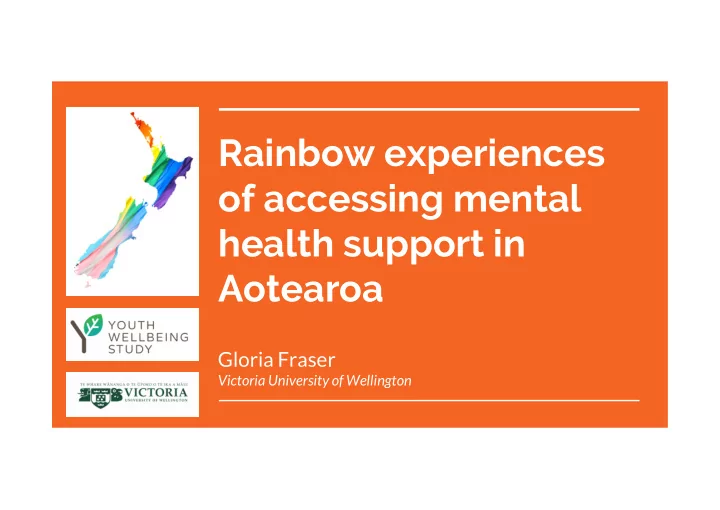

Rainbow experiences of accessing mental health support in Aotearoa Gloria Fraser Victoria University of Wellington
A quick note on language
Background ➔ Rainbow people report higher rates of depression, anxiety, suicidality ➔ Mental health disparities due to stigma and discrimination ➔ We need interventions at the societal level and the individual level ➔ Are our mental health services providing the right kind of support?
What happens when queer, trans, and intersex people seek support from mental health services How can these in Aotearoa? experiences inform the provision of mental health care for rainbow clients?
Stages of the project Resource Interviews Online survey development N = 1575 N = 34 for practitioners
Community partners
Interview recruitment
Therapy is a microcosm of the world "I think that our mental health system is indicative of our entire society (…) There is no explicit difference in terms of the way the culture of our mental health system is the same as the culture of our society , and so all the same rules apply" Taylor, cis woman, lesbian, early twenties
Signalling safety Whenever I come out to someone I feel like I'm giving away a piece of myself, and sometimes I'm happy to do it and I trust them with that, but sometimes it feels like someone's just taken something from me . It's mine and it's so personal and integral to who I am and how I experience the world Wallis, nonbinary/genderqueer, gay, late teens
Lack of knowledge I think our linguistic choices are crucial, particularly as minorities. That's kind of how we relate to the world, by choosing certain words to describe us, our behaviours, our histories. I think it's really important to honour pronouns and names (…) if I call myself transgender don't call me a transsexual. I think our word choices are deliberate and I don't like seeing other people mess with those Martin, trans man, queer, mid twenties
Of participants found mental health professionals “mostly helpful” or “extremely helpful” overall
Of participants found mental health professionals “mostly unhelpful” or “extremely unhelpful” overall
Average waiting time between participants first requesting and receiving gender-affirming hormone therapy
Thanks for listening! Any questions? Read the resource: rainbowmentalhealth.nz
Recommend
More recommend